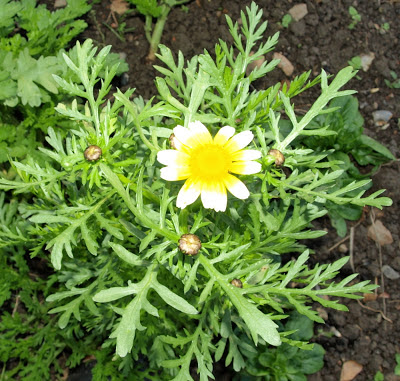Edible chrysanthemum (Chrysanthemum coronarium) is an herbaceous annual from the Asteraceae family. Other names include chrysanthemum greens, garland chrysanthemum, chop suey greens, crown daisy, kikuna, mirabeles and shungiku. Native to the Mediterranean, it has spread throughout Asia and is even found in the Americas. It is grown as an ornamental for the yellow or bi-coloured yellow and white flowers. Alternatively the leaves are used as edible greens particularly in Asian dishes.
Growing Chrysanthemums
Plants are very easy to grow. Sow seeds about 30cm apart in situ or in pots from spring to early autumn. Seeds take around 10-18 days to germinate at 15°C. Sow successively to obtain a regular supply of leaves and flowers. Shoots can be pinched back to encourage a bushy growth. Plants grow to around 60cm in height. They do well in full sun, well drained soil, slightly colder weather, rainy conditions and short days. The photos of the plants on this page were taken today. Plants really thrive in the chilly damp weather and will survive severe frosts and temperatures down to minus °C.
Raw Edible Parts
This plant has raw edible leaves and flowers. The whole plant has a very distinctive aromatic flavour and is rich in vitamins and minerals, particularly potassium. Older leaves and the centre of the flower may be a little bitter. Double check before picking.
The open flowers and unopened flower buds (pearls) can be used to make a beneficial herbal tea. Chrysanthemum tea is a beautiful yellow colour with a very pleasant aromatic flavour. Flowers can be used fresh or dried.
As a point of interest all chrysanthemum flower petals are edible raw.
Issues
Some people may be susceptible to a mild stomach upset or a skin reaction through ingestion or contact with the skin.
 |
| Edible chrysanthemum (Chrysanthemum coronarium) leaves |
Growing Chrysanthemums
Plants are very easy to grow. Sow seeds about 30cm apart in situ or in pots from spring to early autumn. Seeds take around 10-18 days to germinate at 15°C. Sow successively to obtain a regular supply of leaves and flowers. Shoots can be pinched back to encourage a bushy growth. Plants grow to around 60cm in height. They do well in full sun, well drained soil, slightly colder weather, rainy conditions and short days. The photos of the plants on this page were taken today. Plants really thrive in the chilly damp weather and will survive severe frosts and temperatures down to minus °C.
 |
| Edible chrysanthemum (Chrysanthemum coronarium) flower |
Raw Edible Parts
This plant has raw edible leaves and flowers. The whole plant has a very distinctive aromatic flavour and is rich in vitamins and minerals, particularly potassium. Older leaves and the centre of the flower may be a little bitter. Double check before picking.
The open flowers and unopened flower buds (pearls) can be used to make a beneficial herbal tea. Chrysanthemum tea is a beautiful yellow colour with a very pleasant aromatic flavour. Flowers can be used fresh or dried.
As a point of interest all chrysanthemum flower petals are edible raw.
Issues
Some people may be susceptible to a mild stomach upset or a skin reaction through ingestion or contact with the skin.